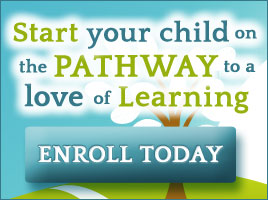“I have studied the child, I have taken what the child has given me and experienced it and that is what is called the Montessori Method.”
– Dr. Maria Montessori (1870- 1952)
Montessori Philosophy
Dr. Montessori believed that no human being is educated by another person; they must do it themselves in order to succeed. She therefore felt that the goal of the educational process should not be to fill the child with facts but rather to cultivate their own natural desire to learn and to help them express their creative soul as early in life as possible. Her research revealed that children are most eager to learn between the ages of two and six, the period in which a child can absorb knowledge and understanding of their environment like a sponge and consider it a natural and nurturing activity. She also discovered that during these early years there are sensitive age periods when the child shows unusual ability to acquire particular skills and when it is actually easier for them to learn those skills compared to any other point while they are maturing.
She found that small children possess a deep-seated love of logic and order in the arrangement of things around them and will work best within a carefully prepared environment that gives order and logic to the impressions they receive. She created an environment scaled to a child’s size and geared to their early learning needs. It allowed them to experience the excitement of learning by their own choice and at their own speed. She believed that children are best able to comprehend their environment in very concrete ways, through immediate personal contact, and so she designed Montessori learning tools and techniques to lead the child forward towards the ability to work in abstraction: the numbers, letters, and ideas which older people use to represent concrete things. When a child begins to explore these activities, they approach them in the same natural way they learn to walk and talk.
She felt that a teacher should serve as an enthusiastic guide in the child’s progress from simple to complex, from using rudimentary to refined tools and from “out of” to “self” control. Montessori directresses should not be the source of all their knowledge and discipline. She saw that, from her own personal experience, the child learns best from other children. This led to her mixed age group approach where grouping children together in order to give the youngest ones a graded series of models to imitate and the older ones an opportunity to reinforce their own knowledge by leading those younger. Her research also indicated that learning should be fun, and children have fantastic powers of concentration if properly stimulated, far exceeding that of most adults.
When you observe the Montessori class in action, you understand the secret of her success. The habits, skills and approach to learning which a child develops in a Montessori class can last a lifetime. They help the child work more effectively, to observe more carefully, to concentrate more effectively, to learn more joyfully, and thus to realize their own best potential throughout life. They have the tools to continue their self-education – the only real education – no matter where they go.




